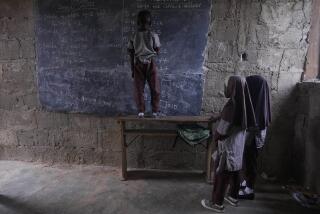Oil Workers Find Life Is Harsh in Swamps of Nigeria’s Outback : Outposts: Employees on Niger Delta endure civil unrest, long hours, little recreation and lack of female companionship.
- Share via
UGBORODO, Nigeria — Dense snake-infested jungle and polluted water surround Nigeria’s remote Escravos oil fields, where civil unrest, long work hours, limited drinking and no women test the endurance of oilmen.
“Its time for some cool beers and chicks,” said a joking but wistful Charles Adeniji as the noon sun beat down on the field’s coastal headquarters operated by Chevron.
“It is a life. You really have to like the job because it is not a normal existence,” added Adeniji, a U.S.-educated Nigerian who controls onshore operations at Escravos.
Nigerian police patrol the headquarters because of violence in mid-September. About 400 local people burst through the perimeter fence to smash cars and offices.
Vandals left untouched crude oil storage tanks, with a total capacity of 3.6 million barrels. “The whole place could have gone up if they had been attacked,” Adeniji said.
Violence also hit the nearby Shell-operated Forcados field in the Niger Delta area of southeastern Nigeria in late October, hampering production after leaving an offshore platform ablaze.
No visible effects of the violence can be seen at Escravos, where women who do not work in the oil industry are banned, alcohol is allowed only after 6 p.m., and a normal working day can last 17 hours.
“It was a desperate situation. There is still some tension,” said Jim Blackwell, operations manager at Escravos, next to the village of Ugborodo and accessible only by air from Lagos, 140 miles away, and the nearer town of Warri.
Escravos, along what was known to European and American traders in the 19th Century as the Slave Coast, has been an oil center since the early 1960s.
Chevron Nigeria is among such foreign firms as Shell and Mobil of the United States and France’s Elf operating in minority partnerships with the state-run Nigerian National Petroleum Corp.
Escravos is responsible for most of Chevron’s 300,000- to 310,000-barrel-per-day oil output in Nigeria, about one-sixth of the OPEC-member country’s total production.
Helicopters fly overhead at Escravos, going to and from the many offshore wellheads and rigs dotting the Bight of Benin, as well as oil stations in swamps along the muddy Escravos River.
“Life is difficult because there is no place to go and no chance for exercise,” said field supervisor Paul Isoa, on the offshore Okan producing platform seven miles out to sea.
Chevron’s 250 employees at Escravos say life on the rigs and in the 640-acre office site is a challenge, eased for many by working for one month, with the next on leave.
“Living here is very challenging. Things are difficult to get done and there is a mainly non-technical labor force in the area,” said Blackwell, who has also worked in the Gulf of Mexico.
Apart from the Chevron employees, Blackwell, who is from Mississippi, also controls during his one-month stints 1,000 contract and casual workers, many from local villages.
Blackwell’s people are quick to decry comments by some Nigerians that trouble from local communities in one of the country’s most backward areas stems from jealousy over the lifestyle of oilmen in the field.
“If this is meant to be decadence, where is the caviar, women and high-living?” said one employee.
The site has an airport, offices, living quarters, a harbor, garages, a free restaurant with food brought in regularly by air, a movie house and a swimming pool.
Blackwell escaped death during September’s riot when he hid for four hours in a false ceiling while vandals with machetes ransacked his office below.
He said the trouble started at dawn when an overloaded canoe carrying mainly casual workers from a village capsized and 14 people drowned.
“What has happened has happened. It is over now,” said Felix Tom, a 20-year-old Ugborodo villager, whose brother was drowned.
Communities in the Niger Delta have been agitating for several decades for greater compensation from oil companies for pollution and other effects of the oil industry.
The speed with which the Escravos trouble erupted took Chevron by surprise and highlighted the depth of local feeling.
“The communities have targeted the oil companies because they know the companies are responsive and we have the ability to do something about it, and do,” Blackwell said.
“Last year we had an oil spill involving about 80 barrels. The villagers would not allow us to start to mop it up until it had reached their shores. The implication is obvious,” he said.
Some oil company officials say little government action has been noticed on using a fund, generated from 1.5% of oil revenues that totaled about $7 billion last year, to improve the lot of affected communities.
Chevron spokesman Sola Omole said the company and NNPC had earmarked the equivalent of $5.3 million next year for community-related ventures, up from $3.6 million in 1991.
They are building a clinic on the other side of the river and a site, to include modern amenities, for several hundred local people now living in poverty.
More to Read
Sign up for Essential California
The most important California stories and recommendations in your inbox every morning.
You may occasionally receive promotional content from the Los Angeles Times.










